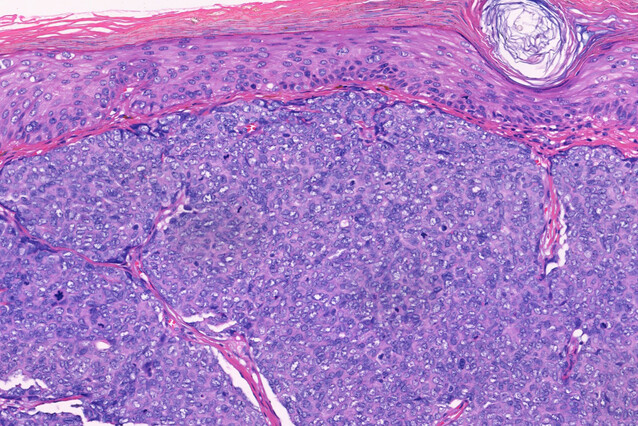Targeting cell fate regulators to treat rare skin cancer
Merkel cell carcinoma (MCC) is a highly aggressive skin cancer with limited treatment options. Scientists at the Research Institute of Molecular Pathology (IMP) in Vienna have now identified an epigenetic factor – the protein LSD1 – that may prove to be a novel and effective therapeutic entry point in MCC. The study is published in the current issue of the journal EMBO Molecular Medicine.
Merkel cell carcinoma (MCC) is a rare but highly metastatic skin cancer that may spread to multiple organs. It commonly develops in elderly and immunosuppressed people. Conventional treatments such as radio- or chemotherapy show only limited and short-lived improvements; and immunotherapy has proven to be effective only in a subgroup of patients. There is therefore an unmet need to identify new entry points for targeted therapies to treat MCC patients.
MCC lacks actionable mutations
Lukas Leiendecker and Pauline Jung, two doctoral students supervised by Anna Obenauf at the IMP and Thomas Wiesner from the Medical University of Vienna, teamed up to identify new targets for future therapies. A conventional approach to track down such new targets would be to identify mutations that are unique to the tumour cells and to subsequently develop a treatment that targets such a mutation. This strategy, however, has proven to be difficult in MCC because about 80 percent of cases are associated with a polyomavirus, where - contrary to most other types of cancer cells – no actionable mutations can be found.
Leiendecker and Jung therefore focused their analysis on epigenetic regulators in MCC cells that could be utilised for targeted therapies. These factors influence the structure and function of the DNA-molecule in a way that does not directly affect the DNA-sequence but rather the interpretation of the genome. Epigenetic regulators are important for maintaining cell identity and differentiation, and their dysregulation or mutation can give rise to aberrant cell states, such as cancer. Interestingly, tumour cells often exploit such epigenetic regulators to display signs of immaturity by blocking differentiation programs. Therefore, epigenetic regulators have recently emerged as possible entry points for targeted therapies.
To identify epigenetic factors that are essential for maintaining the oncogenic program of MCC cells, the IMP researchers performed a drug screen, targeting a large number of epigenetic regulator proteins. They identified the enzyme lysine-specific histone demethylase 1A (LSD1/KDM1A) as a very specific and highly selective epigenetic factor that – when inhibited –abolishes tumour growth of MCC. In mouse studies, the researchers were able to control tumour growth in all mice by administering pharmacological inhibitors of LSD1.
Targeting cell fate regulators
Leiendecker and Jung found that pharmacological inhibition of LSD1 results in the disruption of a multi-protein complex, the LSD1-CoREST, at the core of which LSD1 sits. Integrity of this LSD1 protein complex is essential for tumour growth by repressing genes that promote differentiation, especially that of the neuronal lineage. De-repressing these neuronal genes eventually results in cell cycle arrest and cell death.
While cancer therapies that target cell fate regulators, such as LSD1, are not entirely new, they have demonstrated clinical activity in certain forms of blood cancers, but have hardly been explored in solid cancers. This study is among the first to reveal LSD1 as a potential therapeutic target in a solid tumour. The results provide a strong basis for evaluating LSD1 inhibitors in clinical trials for patients with Merkel cell carcinoma.
Original Publication
Leiendecker L., Jung P.S., Krecioch I., Neumann T., Schleiffer A., Mechtler K., Wiesner T., and Obenauf A.C. LSD1 inhibition induces differentiation and cell death in Merkel cell carcinoma. EMBO Molecular Medicine, 7 October 2020.
About the Vienna BioCenter PhD Programme
Much of the work underlying this publication was done by doctoral students of the Vienna BioCenter PhD Programme. Are you interested in a world-class career in molecular biology? Find out more: https://training.vbc.ac.at/
